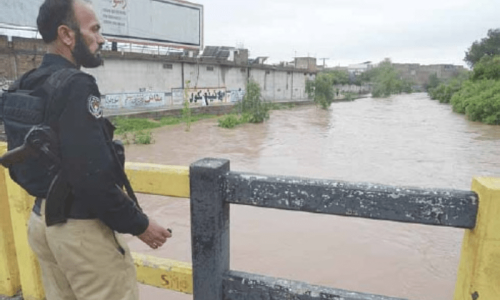PESHAWAR: The overwhelming response to the registration of undocumented Afghan citizens put a damper on the slow process of voluntary repatriation of refugees to their homeland.
National Database and Registration Authority registered 25,000 Afghans in nine days across the country. Commissionerate for Afghan Refugees and Afghanistan Ministry of Refugees and Repatriation are overseeing the documentation process that was launched on August 16.
Nadra has set up 21 registration centres across the country including 11 in Khyber Pakhtunkhwa. The process will continue till the end of December to issue Afghan Citizen Cards (ACCs) to one million Afghan nationals.
Insecurity, unemployment and shortage of facilities in Afghanistan slow down voluntary repatriation programme
On the contrary, the UNHCR-sponsored voluntary repatriation process is going very slow and around 48,000 Afghan refugees have repatriated from Pakistan to their homeland since April 3. Unlike Nadra’s registration centres, the sprawling voluntary repatriation centre in Chamkani offers a deserted look.
The UN refugee agency is paying $200 to every returnee under the programme, but the refugees are reluctant to head back to their country despite social and financial hardships and alleged harassment at the hands of law enforcers, especially police, in Pakistan.
Jamal Nasir, a schoolteacher residing in Yakatoot locality of Peshawar, says that prevailing situation in Afghanistan forces his countrymen to bear abuses at the hands of law enforcers and spend a tough life in Pakistan despite paying a heavy price in the armed conflicts between Afghan forces and Taliban.
“People have been caught between Taliban and Afghan army. After sunset, Taliban start raiding villages and people have to answer Afghan army in the day,” said Mr Nasir, a native of Afghanistan’s Paghman valley.
“Life in Afghanistan is like sitting on a stockpile of explosives. I came back to Peshawar, my birthplace, in 2016,” he said, sitting outside Nadra centre in Peshawar’s Nishtarabad locality to get himself registered.
Mr Nasir had moved to Afghanistan in 2015 when police launched crackdown against illegal Afghan nationals. He failed to obtain Proof of Registration Card that validates stay of around 1.4 million Afghan refugees in Pakistan. Approximately 200,000 unregistered Afghans had gone back to their country in 2016 to avoid deportation.
Like Mr Nasir, hundreds of undocumented Afghan citizens are approaching the Nadra centres across Pakistan everyday to get Afghan Citizens Cards (ACC). The card will legalise their stay in the host country.
Officials of the Afghan government are overseeing the registration process at every centre. They are also maintaining particulars including fingerprints of every individual, approaching the centres for registration.
“The process is going a bit slow because Afghan officials get more details of every family and send documents to Kabul,” said Qudratullah, head of the centre in Nishtarabad.
Officials dealing with refugees said that poverty, unemployment, shelter and shortage of basic amenities like health and education were main factors that discouraged Afghans from returning to their country apart from security.
Over 400,000 refugees had repatriated to their country under the voluntary programme last year in addition to around 200,000 unregistered Afghans. But the process has slow downed this year. The UN agency has decreased cash return package from $400 to $200 that also affected the return process.
“Reduction in cash grant could be one of the reasons of the slow return. But Afghan government also failed to fulfil its commitments with the returnees that caused setback to the repatriation process,” said one official of UNHCR. He said that Afghan government didn’t fulfil its commitment to provide land to the returnees free of cost.
The official said that Afghan government had conducted special drive through media to motivate refugees to return Afghanistan and play role in reconstruction of their war-torn country.
“That campaign was effective but Afghan government dropped it due to unknown reasons,” he said.
The cash strapped UN agency is using cash assistance as an incentive to motivate refugees to return to their country, but they (refugees) say that $200 per head is a peanut.
“I feel secure in Pakistan as compared to Afghanistan. My children have opportunities to get education and other basic facilities,” said Taj Mohammad Shinwari, a native of eastern Nangarhar province of Afghanistan.
Afghan Citizens Card is temporary relief for the Afghans, who do not have legal status in Pakistan. The card will protect them from harassment by police, but they will not be able to get refugee status.
The government has yet to come up with a solution about the fate of ACC holders. The federal government did not make decision whether the newly registered Afghan citizens would be brought under the visa regime or would integrate them with the local population.
Presently the ongoing registration drive will help Safron and interior ministry to compile particulars of undocumented Afghan nationals. “Let the process finish and they may become the UNHCR child,” said another official.
Published in Dawn, August 28th, 2017
















































Dear visitor, the comments section is undergoing an overhaul and will return soon.